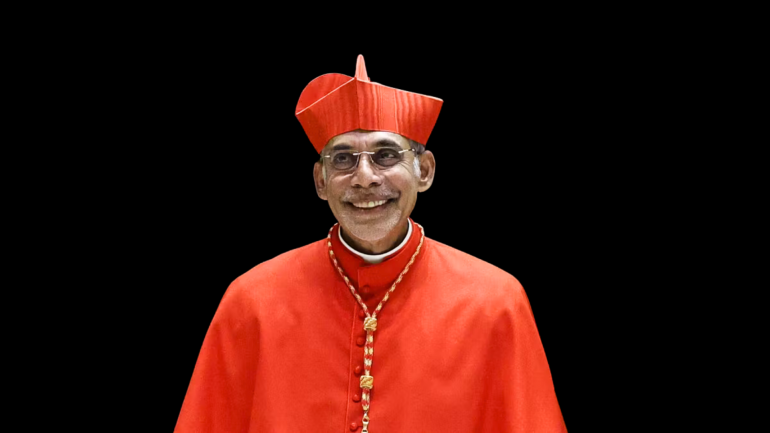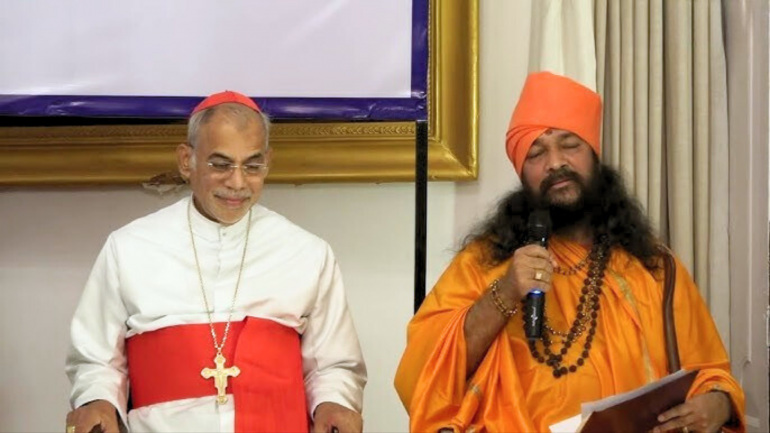“Co-responsibility is not a concession; it is a baptismal claim!”

In this exclusive interview given to Radio Veritas Asia, Cardinal Filipe Neri Ferrão, President of the CCBI and FABC, reflects on the meaning of synodality in today’s rapidly changing and polarized world, his hope for the future Church in Asia, the role of the laity and youth, and the gifts he is grateful for during his long and illustrious ministry as a priest and bishop.
Excerpts.
In a changing, polarized world, especially with the rise of social media and AI, how can synodality foster unity, both within the Universal Church and beyond?
For me, synodality means walking together, listening deeply, and discerning God’s will as a community. In today’s polarized world, especially with social media and AI sometimes dividing us, synodality offers a way to rediscover unity. It calls us to pause amidst the noise, to create spaces where voices, especially those often unheard, are genuinely listened to. This kind of collective listening and openness can help heal divisions not only within the Universal Church, but also beyond.
Synodality was a key focus of Pope Francis. With Pope Leo XIV, do you see this emphasis continuing? How will synodality reflect the universality of the Church in this new chapter?
Pope Francis laid a strong foundation for synodality, and Pope Leo XIV is continuing this emphasis with great conviction. Synodality truly reflects the universality of the Church by inviting everyone, no matter where they come from or what role they play, to participate in discerning God’s direction together.
We must remember that it was the wish of Pope Francis that the synodal path did not end with the Assembly’s Final Document in October 2024. Now, with Pope Leo XIV, it has moved into an implementation phase that invites local Churches to translate proposals into concrete reforms and ministries. The recent Apostolic Exhortation Dilexi Te carries the invitation to positively include the underprivileged in the process.
Pope Leo XIV visited the General Secretariat of the Synod on 26 June 2025. In his brief address to them, he said: “Pope Francis has given a new impetus to the Synod of Bishops, taking his cue, as he has often said, from Saint Paul VI. And the legacy he has left us seems to me above all this: synodality is a style, an attitude that helps us to be the Church, fostering authentic experiences of participation and communion … I encourage you in this work, I pray that it may be fruitful, and I am grateful to you already.”
How can these perspectives contribute to a more inclusive expression of synodality in the Church in Asia, especially India?
Asia, especially India, is uniquely positioned with its rich theological, spiritual, and cultural heritage shaped by interactions among many religions. These traditions teach us the beauty of dialogue, respect, and coexistence. Asia has a lot of images and practices of synodality: ‘taking off the shoes’ (sense of sacred, respect, letting go of one’s status), ‘circle of elders’ (inclusion, diversity, dialogue, growth, listening, gender and religious complementarity), ‘tree’ (communion as roots, participation as trunk, and mission as branches), and ‘rangoli’ (complementarity of colours, centre and periphery correspondence, subsidiarity).
Asia brings a lived expertise in interreligious encounter, familial piety, and community-based solidarity. From Small Christian Communities to practices of hospitality across faiths, Asian Catholics can learn how to listen without fear and cooperate for the common good. India’s theological reflection at the intersection of many religions also equips the Church to articulate the Gospel with intellectual humility and cultural resonance.

In India, how can the Church encourage the laity to take a more active part in the synodal process?
In India, where clergy have often held the central role in Church life, synodality invites us to rethink how we can journey together. It is important to create opportunities where the laity feel empowered and encouraged to share their insights and gifts. These efforts should foster collaboration rather than competition, with the clergy acting as facilitators and companions in the process.
Another way of ensuring the participation of the laity is by promoting steward-leadership. While the clergy safeguard faith, sacraments, and communion, the laity exercise co-responsibility in councils, ministries, and mission fields, where their competence is decisive. Concrete steps include parish pastoral councils with real charters and timelines, trained lay facilitators for “conversations in the Spirit,” shared accountability for budgets and priorities. Co-responsibility is not a concession; it is a baptismal claim!
Asia is home to 60% of the world’s youth. What message would you offer to young Catholics in the region eager to engage with synodality and shape the Church’s future?
To the young people in Asia, I would say: your energy, creativity, and faith are gifts the Church needs urgently. Synodality invites you to be bold, to raise your voices, and to help shape the future of the Church. Don’t wait to be asked; step forward with your questions, your ideas, and your passion for a Church that listens, loves, and walks with everyone. You are not just the Church of the future; you are active participants in the Church’s journey today, as Pope Francis said in Christus Vivit.
Bring your questions and your gifts. The Church needs your digital intelligence, your impatience with injustice, your creativity in worship and service. Learn to pray; build communities that are welcoming on-site and online; and refuse both cynicism and naïveté.
Finally, going off topic, what are you most grateful for in your service to the Church?
I am grateful to the Lord that I have been able to make some modest contributions towards making ‘synodality’ possible, first at the CCBI level: (a) For the CCBI Pastoral Plan: Mission 2033; (b) For implementing the Spiritual Conversation Method at the Plenary Assembly of the CCBI; (c) For helping CCBI Commissions to work with the principle of inclusion, diversity, dialogue and listening.
At the level of the FABC, I have been able to advocate for an Asian perspective in the universal Church, one that embraces interfaith dialogue and the spiritual wealth of the continent’s many traditions. This inclusivity is bound to enrich the Church’s synodal journey worldwide.
Above all, I am grateful for the grace, the quiet fidelity of the Lord, that has carried me far beyond my merits. In every place I have served, parish, diocese, and the wider Church in India and Asia, I have been genuinely moved by the holiness of ordinary believers: families who keep faith amidst hardships, catechists and teachers who form the young, religious women and men who witness with joy, and priests who spend themselves for their people.
I am also grateful for the privilege of standing close to the altar; for moments of unity experienced across languages and rites; and for the courage of our youth, who ask honest questions and still choose the Gospel.








